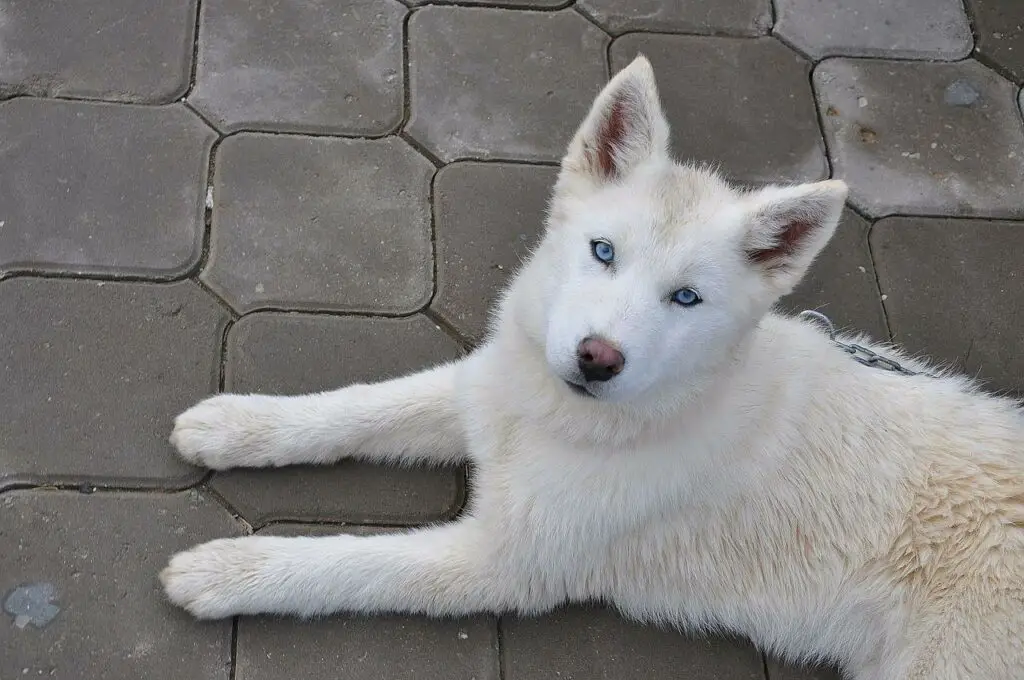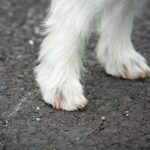Cashew butter has become an increasingly popular dairy-free and vegan-friendly staple in most of our diets.
If you love to munch on a sandwich slathered in cashew butter, you might wonder if it’s OK to share with your dog.
So, can dogs have cashew butter?
Yes.
Cashew butter in small doses is safe for dogs to eat, as long as the cashews have been roasted or cooked first.
This is because raw cashews contain toxins that could cause gastrointestinal upset such as vomiting or diarrhea if ingested by dogs.
This article will discuss everything you need to know about cashews and fidos.
It will also discuss the health risks your dog may experience from consuming cashew butter in excess.

Is cashew butter good for dogs?
Yes.
Cashew butter is safe to feed your dog as long as the cashews have been cooked or roasted first.
Raw cashews contain toxins eliminated when exposed to high temperatures through cooking or roasting.
Cashew butter is high in protein and fats, which can be beneficial for young active dogs as they provide them with stronger muscles and fuel the muscles with the energy required for movement.
The same cannot be said for older or overweight dogs, as excess proteins and fats can be harder on their system.
This is because the body stores the extra protein as fat which contributes to obesity.

When does cashew butter become dangerous for dogs?
Cashew nut butter contains additives, preservatives, oils, and excess sugar and salt that can lead to the following health issues for your dog:
Liver failure
Some commercially available cashew butters contain xylitol or birch sugar, an artificial sweetener that can be potentially life-threatening to dogs.
This is because xylitol causes a rapid and massive insulin release in dogs resulting in acute weakness, staggering, vomiting, and liver failure.
Kidney disease
The high sodium content in cashew butter may relapse existing health conditions in dogs with kidney disease or heart-related issues.
Salt may increase blood pressure, further worsening kidney damage, especially in older dogs.
The kidneys are responsible for filtering excess salt from the bloodstream, but additional salt can quickly accumulate in the bloodstream to dangerous levels when the kidney function is reduced.
Pancreatitis
Dogs with pancreatitis should not have cashew butter as it is high in fats.
Excessive consumption of high-fat foods can cause obesity in dogs and other health problems such as pancreatitis.
For breeds genetically prone to pancreatitis, eating cashew butter in excess can expose them to the condition.
The excess fat can lead to the inflammation of the pancreas, which can be fatal if left untreated.
Abnormal heart function
The high potassium levels in the cashews may increase acidity in the dog’s blood, directly impacting the heart’s ability to function normally.
This makes it a high-priority condition requiring immediate vet care.
If your dog ingests cashew butter in excess, it can also cause problems in the urinary tract for dogs as the uric acid in the urine can form stones in the kidney.
Harmful ingredients in cashew butter for dogs
Some commercially available cashew butter contains harmful ingredients that may be detrimental to your dog’s health.
These include:
- Salt – Cashew butter has a high sodium content that can lead to dehydration or high blood pressure in the long term. Your dog may also develop a condition called salt poisoning, whose symptoms are difficulty urinating, excessive thirst, fever, diarrhea, seizures, and tremors
- Sugar – The sugar in the cashew butter can cause digestive discomfort in dogs, including stomach pain and distress, as well as diarrhea if your dog eats it in excess
- Xylitol – Some kinds of cashew butter may include xylitol as an artificial sweetener which is highly toxic to dogs even in small amounts. Xylitol can cause a rapid and massive insulin resistance in dogs that may cause dangerously low blood sugar, leading to seizures, acute weakness, liver failure, and death
- Oil – Cashews used to make cashew butter are rich in oil which can be harmful, especially for dogs with pancreatitis. If your dog ingests too much cashew butter, the oil in it can cause digestive issues such as an upset stomach or diarrhea
- Chocolate – Some cashew butter may contain chocolate to create depth in their final product’s taste. Chocolate can be lethal to dogs as it contains theobromine which can be challenging for your dog to metabolize effectively, causing severe illness and even death
Health benefits of cashew butter for dogs
When offered in moderation, cashews in the cashew butter can be an occasional healthy snack for your dog if he’s not allergic to nuts.
Some of the beneficial nutrients in cashew butter include:
- Healthy fats – Cashew nuts contain saturated and polyunsaturated fats, which are a good source of energy and essential fatty acids. These fats are vital for good skin and coat in dogs
- Magnesium – The magnesium found in cashew nuts aid in contracting and relaxing of muscles as well as muscle regeneration
- Protein – Cashews are rich in protein, providing your dog with stronger muscles, bone, and body mass. It also improves nerve function, aids the creation of cells, and can help in healing your dog’s wounds
- Iron and selenium – Iron is vital for bodily function and helps provide oxygen to organs, while selenium benefits the thyroid gland and regulates inflammation in the body
Can dogs have cashew allergies?
Some dogs may be allergic to nuts which may cause digestive issues such as diarrhea and gassiness.
Other symptoms may include itchy skin, hair loss, hot spots, ear inflammation and scratching, and head shaking.
Although relatively uncommon, hypersensitivity to nuts might occur.
If you allow cashew butter to dogs with severe allergies, expect symptoms like hives, swelling, vomiting, inability to use hind legs, and diarrhea.
In case of hypersensitivity to nuts, rush your dog to the vet immediately.
In summary
Cashew butter is not only a creamy and delicious snack for fido, but it’s also a nutritious way to add texture and flavor to your dog’s homemade treats.
Remember to offer your dog cashew butter in moderation, so long as it doesn’t contain harmful ingredients like xylitol.
- What Dog Breeds Have Pink Skin? - March 24, 2023
- What Are the Most Inspiring Dog Breeding Quotes? - March 20, 2023
- Can Pheromone Spray Help Improve Dog Breeding Results? - March 19, 2023








